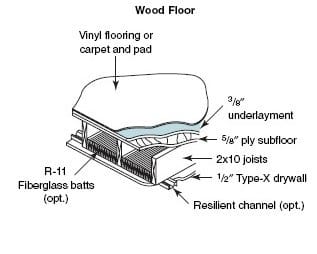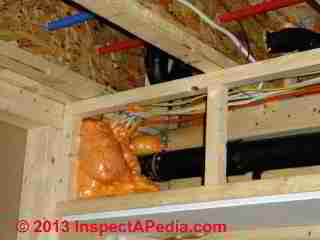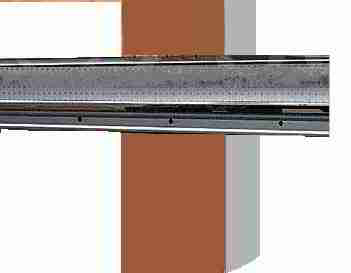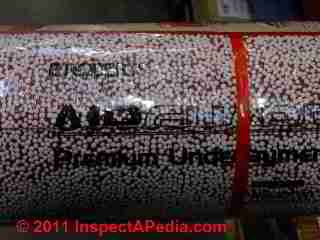 Properties of Soundproofing Materials and Sound Control Workmanship
Properties of Soundproofing Materials and Sound Control Workmanship
- POST a QUESTION or COMMENT about the choices & properties of sound proofing materials used in buildings
Building soundproofing materials & options:
Here we provide a list of soundproofing materials & devices used to control sound transmission in buildings: how to make a quiet home, office, or place of business using sound isolation for ceilings, floors, walls, plumbing, etc.
InspectAPedia tolerates no conflicts of interest. We have no relationship with advertisers, products, or services discussed at this website.
- Daniel Friedman, Publisher/Editor/Author - See WHO ARE WE?
List & Properties of Soundproofing Materials and Workmanship
 Like weatherization work, effective soundproofing requires
careful detailing and workmanship. Small holes and
bypasses can lower field STC values to 15 to 20 points
below laboratory values.
Like weatherization work, effective soundproofing requires
careful detailing and workmanship. Small holes and
bypasses can lower field STC values to 15 to 20 points
below laboratory values.
Leaky edge joints, unsealed doorways, interconnecting ductwork, and unsealed electrical and plumbing penetrations all degrade acoustical performance.
This article series discusses noise and sound control in buildings, and includes excerpts or adaptations from Best Practices Guide to Residential Construction (Steve Bliss, J Wiley & Sons) , by Steven Bliss, courtesy of Wiley & Sons.
Article Contents
- ACOUSTICAL SEALANT FOR SOUND CONTROLl
- RESILIENT CHANNEL FOR SOUND REDUCTION
- INSULATION DETAILS FOR SOUND REDUCTION
- GASKETING FOR NOISE CONTROL
Acoustical Sealant for Sound Control in buildings
While special non hardening acoustical sealants are often specified in commercial work, any high-quality sealant that remains flexible can be effective in blocking sound transmission. Butyl, silicone, and urethane caulk can all be used.
To prevent sound leaks, use sealant around electrical boxes, plumbing penetrations, and any other penetrations in the wall or ceiling surface.
For walls with STC ratings in excess of 35, apply a flexible sealant at the joint where the drywall meets the floor.
Acoustical sealant is also used to seal around the perimeter of walls or ceilings hung from resilient channel.
Details: Readers who need to know more about the use of acoustical sealants for sound control in buildings or who need to know where to purchase acoustical sealants should see ACOUSTICAL SEALANT CHOICES
Soundproof Acoustical Grade Drywall Products, Quietrock, QuietWood, & Sound-Resistant Windows
Special drywall products such as Quietrock ® are sold in as many as eight product variations ranging from economy sound-transmission-resistant drywall to fire-rated and high performance soundproof drywall. According to the product manufacturer"
QuietRock replaces older techniques such as resilient channels, clips, sound board and vinyl and offer lower cost solutions than other methods with higher SOUND TRANSMISSION CLASS (STC) [article] performance.
The company, Quiet Solution, a division of Serious Materials, also produces QuietWood® "a multi-layer engineered internally damped panel ideal for use in existing or new construction, ...
used in place of standard plywood in most applications" and QuietHome® noise reducing indows, additional sound-transmission resistant products.
Example of Soundproof Drywall
- Quietrock® soundproof drywall is distributed by Serious Materials Inc. 1250 Elko Drive Sunnyvale, CA 94089 - more information is at http://www.quietsolution.com/html/quietrock.html
Resilient Channel for Sound Transmission Reduction in buildings

Resilient channel
such as Auralex RC8 is installed perpendicular to the studs or joists and needs at least 3 inches of free space in the cavity behind it to be effective.
Resilient channel is a specially-formed, metal device that, when used to hang drywall (instead of attaching the drywall directly to the wall studs or ceiling joists), significantly reduces the sound transmission of the wall or ceiling system.
The resilient channel material is secured to the studs and drywall is secured to the channel - providing a break in sound transmission through the wall.
Resilient channel for sound control is not effective if attached to sheet materials, such as drywall. It is also important to use the right length screws, so they do not penetrate into the wood framing.
Just a few screws into the wood can undermine the resilient connection and substantially lower the STC and IIC ratings.
Leave a 1/4 to 1/2-inch gap around the perimeter of a ceiling or wall hung from resilient channel and fill with an acoustical or other non hardening sealant.
Example of Resilient Channel for Sound Control in Buildings
- Auralex resilient channel, additional information: from Auralex acoustics www.auralex.com/, a producer of 800-959-3343
Auralex's RC-8 Resilient Channel is a specially-formed, sturdy metal device that, when used to hang drywall (instead of just attaching the drywall to the studs or joists), GREATLY improves the sound transmission characteristics of the wall or ceiling system.
RC-8 should be installed horizontally at the bottom and top of your wall, then every 2' or less in between. Up to (2) layers of 5/8" drywall and a layer of SheetBlok may be hung on RC-8, even on a ceiling.
Insulation Details for Sound & Noise Reduction in buildings
Ordinary fiberglass insulationis an effective sound absorber in cavities and increases the STC rating of walls by 3 to 5 decibels. The insulation needs to fill only about three-quarters of the thickness of the cavity to be effective.
Adding more adds little additional sound protection, and stuffing insulation in too densely could actually increase sound transmission.
Cellulose insulation
has about the same sound deadening characteristics as fiberglass.
Foam insulation
is not particularly effective for sound control. Foam is too light to add mass to the wall and is not resilient enough to absorb sound.
Subfloor and laminate floor underlayment:
for sound transmission reduction in floors also see NOISE CONTROL for FLOORS - our photo (above left) illustrates a sound-transmission-reducing flooring underlayment material.
Examples of Insulation Products Specifically for Noise & Sound Control
- MINERAL WOOL STC TYPICAL SOUND BARRIER ASSEMBLIES [PDF] Johns Manville Corporation, Building Insulation Division P.O. Box 5108 | Denver, CO 80217-5108 USA Website: www.JM.com Tel: 1-800-654-3103 | retrieved 2018/06/08, original source: https://www.jm.com/content/dam/jm/global/en/ building-insulation/Files/BI%20Data%20Sheets/ BI%20Canada/BID_CAN_6MineralWoolSTC.pdf
- SOUND ATTENUATION FIRE BATT INSULATION / MINERAL WOOL, [PDF] Owens Corning, retrieved 2018/06/08, original source: http://www2.owenscorning.com/around/sound/commercial_acoustics/soundatt.pdf
- ACOUSTICAL ASSEMBLIES, [PDF] U.S. Gypsum Corp., retrieved 2018/06/08, original source: http://www.usg.com/content/dam/ USG_Marketing_Communications/united_states /product_promotional_materials/finished_assets/ acoustical-assemblies-en-SA200.pdf
- SOUND ATTENUATION BATTS [PDF], Owens Corning, retrieved 2018/06/08, original source: https://www2.owenscorning.com/around/ sound/commercial_acoustics/pdf/ SoundAttenuationBatt.PDF
Gasketing for Building Sound Transmission Control
Flexible, heavy rubber gasketing makes an effective seal against sound leaks as well as thermal leaks around doors and windows.
Either bulb- or magnetic-type weather-stripping is effective as long as it makes an airtight seal between the frame and door or window.
- - Adapted with permission from Best Practices Guide to Residential Construction (Steve Bliss, J Wiley & Sons) .
...
Continue reading at VIBRATION DAMPENERS or select a topic from the closely-related articles below, or see the complete ARTICLE INDEX.
Or see these
Recommended Articles
- ACOUSTICAL SEALANT CHOICES
- MINERAL WOOL - ROCK WOOL INSULATION
- NOISE / SOUND DIAGNOSIS & CURE - home
- VIBRATION DAMPENERS
Suggested citation for this web page
SOUNDPROOFING MATERIAL PROPERTIES at InspectApedia.com - online encyclopedia of building & environmental inspection, testing, diagnosis, repair, & problem prevention advice.
Or see this
INDEX to RELATED ARTICLES: ARTICLE I NDEX to BUILDING NOISE DIAGNOSIS
Or use the SEARCH BOX found below to Ask a Question or Search InspectApedia
Ask a Question or Search InspectApedia
Try the search box just below, or if you prefer, post a question or comment in the Comments box below and we will respond promptly.
Search the InspectApedia website
Note: appearance of your Comment below may be delayed: if your comment contains an image, photograph, web link, or text that looks to the software as if it might be a web link, your posting will appear after it has been approved by a moderator. Apologies for the delay.
Only one image can be added per comment but you can post as many comments, and therefore images, as you like.
You will not receive a notification when a response to your question has been posted.
Please bookmark this page to make it easy for you to check back for our response.
IF above you see "Comment Form is loading comments..." then COMMENT BOX - countable.ca / bawkbox.com IS NOT WORKING.
In any case you are welcome to send an email directly to us at InspectApedia.com at editor@inspectApedia.com
We'll reply to you directly. Please help us help you by noting, in your email, the URL of the InspectApedia page where you wanted to comment.
Citations & References
In addition to any citations in the article above, a full list is available on request.
- Marpac, produces white sound generators, a product that they identify as the Marpac sound conditioner. Marpac can be contacted at http://www.marpac.com/ or contact the Marpac Corporation, P.O. Box 560 Rocky Point, NC 28457 Phone: 800-999-6962 (USA and Canada) Fax: 910-602-1435 1-910-602-1421 (worldwide), 800-999- or email: info@marpac.com
- Sound Oasis sound conditioners are produced by Sound Oasis: http://www.sound-oasis.com/ email: info@sound-oasis.com or 1-866-625-3218
- Best Practices Guide to Residential Construction, by Steven Bliss. John Wiley & Sons, 2006. ISBN-10: 0471648361, ISBN-13: 978-0471648369, Hardcover: 320 pages, available from Amazon.com and also Wiley.com. See our book review of this publication.expand and contract. To avoid these problems, make sure pipe runs are not tight against framing.
- In addition to citations & references found in this article, see the research citations given at the end of the related articles found at our suggested
CONTINUE READING or RECOMMENDED ARTICLES.
- Carson, Dunlop & Associates Ltd., 120 Carlton Street Suite 407, Toronto ON M5A 4K2. Tel: (416) 964-9415 1-800-268-7070 Email: info@carsondunlop.com. Alan Carson is a past president of ASHI, the American Society of Home Inspectors.
Thanks to Alan Carson and Bob Dunlop, for permission for InspectAPedia to use text excerpts from The HOME REFERENCE BOOK - the Encyclopedia of Homes and to use illustrations from The ILLUSTRATED HOME .
Carson Dunlop Associates provides extensive home inspection education and report writing material. In gratitude we provide links to tsome Carson Dunlop Associates products and services.


